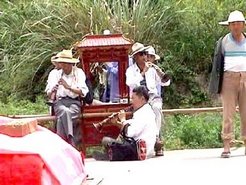Local Property Strategies and New Moral Economies in South Fujian
Local Property Strategies and New Moral Economies in South Fujian
The new project has focussed on three related areas of interest.
1. Fuzzy property, changing power relations and social security. Land rights in rural South Fujian appear fuzzy in two dimensions: in the sense that land expropriation does not terminate the community's sense of ultimate collective ownership and in the sense of a local legal pluralism, where local notions of property rights co-exist in the same field as those of the state and the market. One obvious area of interest here is the intersection between these different notions of rights in the practices of different actors, and their development over time. Another would be how local property strategies affect power and socio-economic stratification in the village, as well as systems of social security in the widest sense of changing entitlements in people and "things".
2. The emergence of new social institutions. A related area of interest has been the re-emergence of temples and kinship groups as powerful new collectives. This development does not only affect local power relations, but might carve out a civil sphere where rights and obligations are renegotiated, thus a new "moral economy" emerges.
3. The new meaning of territorial communities. In contrast to what is considered typical, economic reforms in South Fujian seem to have reinforced the importance of territorial communities as distributors of resources and of "place" as a production site of collective identities. This seems to be both rooted in the pre-socialist and socialist past as well as in the contemporary erosion of collective entitlements, under a nominally socialist state that continues to define citizen rights through territorial affiliation. In Stephan Feuchtwang's words, villages have multiple identities as administrative, collective and traditional places, and they thus can draw on different types of resources inherent in each. This is also an important strategic advantage in an increasingly competitive and changing environment.

A funeral band.
My two new fieldsites, where research for the new project is being conducted, allow insights into these transformations from different and complementary angles. The recent history of Aoguan Village has been shaped by massive land expropriation for the building of a golf course. As a result, six of the twelve former production teams in the village lost all access to farmlands and 44 households had to be resettled. Nine years later, conflicts over the circumstances of this expropriation were still virulent. These conflicts centred, on the one hand, on the actions of the local state, especially with regard to the use of the compensation money, which aroused fears among villagers that they would eventually be left both without financial security and without access to land. One the other hand, they centred on the denial of collective entitlements on part of the owner of the golf course, who provided the villagers neither with adequate jobs in exchange for their land nor, as they said, kept his promise to build a road that linked the resettled households to the motorway passing the village. In interviews, villagers expressed a strong notion of remaining collective entitlements to "their land", even after it "formally" had been sold. In this situation, the re-built local temple emerged as a third "territorial" force, representing another form of collectivity and moral community "in place" and representing and asserting the collective entitlements of villagers against infringements on them by both the state and transnational investors.
The second village, Nanjiang, is an overseas Chinese home community in a region where overseas remittances have already played an important role in local development in the pre-socialist period. After the economic reforms, ties with the overseas community have been resumed and much of the village infrastructure is again financed from overseas. The overseas Chinese claim to both community membership and leadership is asserted in numerous stone stellae that commemorate their generous deeds, as well as in the huge mansions they have built in the village, which remain empty for most of the year. Overseas relatives have also largely financed the rebuilding of ancestral halls, which today control large funds. The local state's selling of land to outsiders of the "socialist collective", which has undermined a socialist "moral economy" rooted in rights to collective land, has also here been met by a revival of the "traditional" collective and place. This has involved both the transformation of private household property into collective "ancestral" property via donations, as well as cases where socialist collective property was (re)transformed into collective lineage property. Though villagers use the same terms (jitide, gongjiade) for socialist collective property and lineage collective property, the second differs from the first, in their opinion, that it cannot be privatised. The new/old collective and its property also stands in an entirely different relationship to the state (see my second working paper at the MPI).
